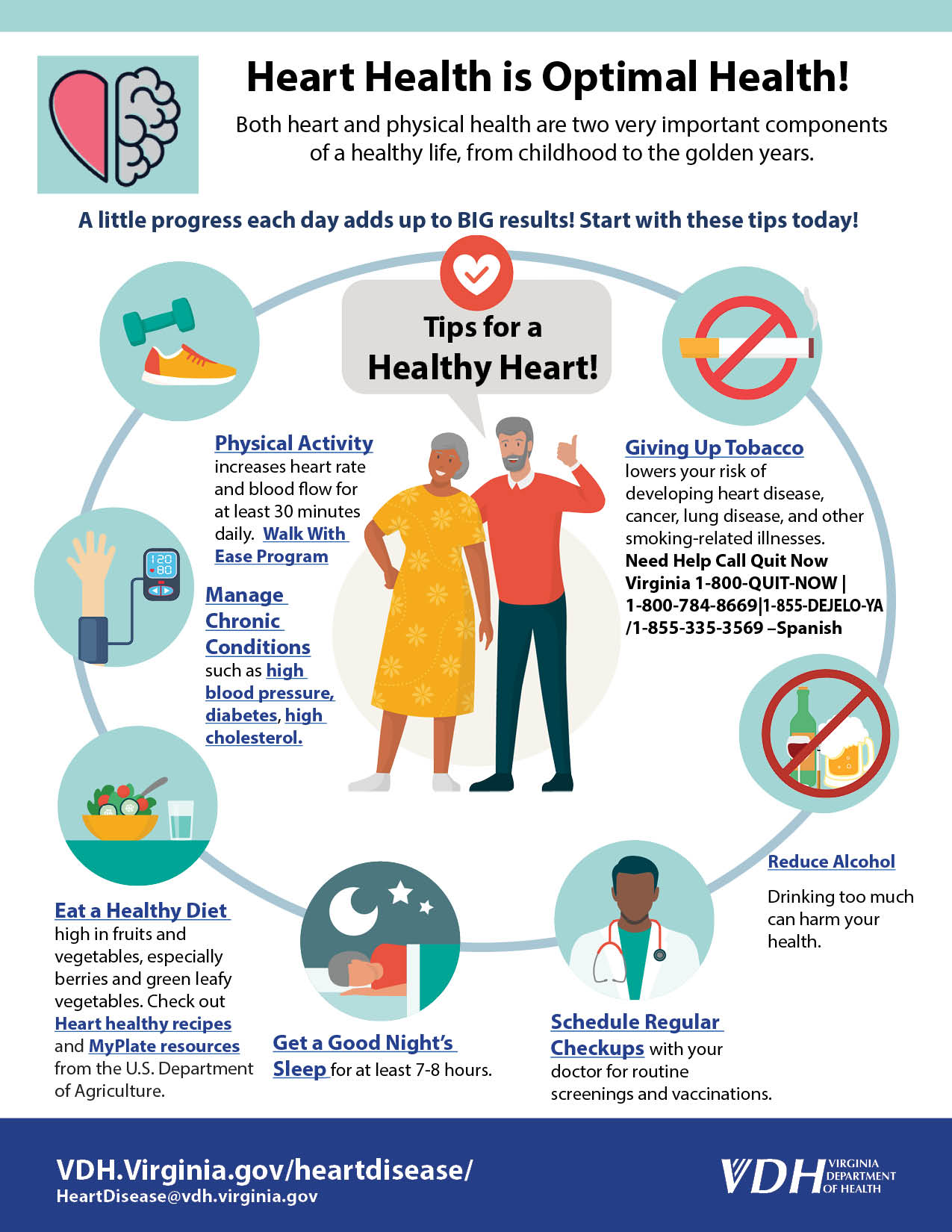Cardiovascular disease prevention is a critical public health strategy aimed at reducing the risk of heart disease, the leading cause of death in the United States. Despite significant advancements in medical technology and treatment options, many individuals remain unaware of the direct correlation between lifestyle choices and their cardiovascular health. Understanding factors like cholesterol levels, blood pressure, and the importance of regular screenings can empower individuals to take charge of their well-being. Heart disease awareness needs to be a priority, as early intervention and effective cholesterol management can dramatically improve outcomes. By adopting healthy habits today, we can pave the way for a healthier tomorrow and significantly lower our odds of developing cardiovascular disease.
Addressing the prevention of heart-related ailments, also referred to as cardiovascular conditions, is essential for fostering a healthier society. The accumulation of risk factors over time, such as high cholesterol and hypertension, underlines the importance of proactive health measures. Individuals often underestimate the threat posed by these conditions, which, unlike cancer, don’t always evoke immediate concern. It is imperative that we emphasize the significance of understanding one’s cardiovascular health and the simple yet effective steps that can be taken to mitigate risks. Through comprehensive education and awareness efforts, we can bridge the gap and ensure that heart health remains a central focus for all.
The Growing Threat of Cardiovascular Disease
Cardiovascular disease, often considered a silent killer, remains the leading cause of death in America, overshadowing other ailments such as cancer. This alarming statistic highlights a pervasive issue: many individuals view heart disease as a distant concern, something they can address later rather than a pressing, immediate health threat. The misunderstanding surrounding cardiovascular disease stems from a lack of awareness and urgency among the public regarding the potential risks associated with issues like high cholesterol and hypertension. As experts assert, proactive measures in understanding and managing cardiovascular health are crucial for long-term wellness.
The general population’s casual attitude towards heart disease can result in devastating consequences. Many patients only become concerned after experiencing symptoms, often too late for effective intervention. As cardiovascular specialists emphasize, risk factors such as elevated LDL cholesterol levels and poor lifestyle choices accumulate over time, leading to significant cardiovascular damage. Public awareness initiatives must work tirelessly to illustrate the dangers of ignoring heart health and the importance of early prevention strategies, including regular screenings and monitoring of cholesterol levels.
Understanding Cholesterol Management Mechanics
Cholesterol management is vital in preventing cardiovascular disease, as high levels of LDL cholesterol significantly increase the risk of heart attacks and stroke. Patients need to comprehend that cholesterol isn’t merely a number; it’s a critical health indicator that necessitates ongoing attention. Lowering LDL cholesterol through diet, exercise, and medication is paramount. Engaging with cholesterol levels from a young age can empower individuals to take charge of their cardiovascular health, fostering a proactive rather than reactive attitude towards heart disease.
Strategies for effective cholesterol management include dietary interventions, increased physical activity, and medication adherence when necessary. For instance, implementing a diet rich in fruits, vegetables, whole grains, and omega-3 fatty acids can significantly improve cholesterol profiles. Furthermore, introducing patients to innovative tools, like wearable fitness devices, can help them track their activities and understand the impact on their cholesterol levels, ultimately driving better health outcomes in the long run.
The Importance of Heart Disease Awareness
Heart disease awareness is fundamentally about educating the public to recognize the serious nature of cardiovascular health risks. Those who develop an understanding of their own risk factors—such as cholesterol levels and blood pressure—are more likely to take proactive measures in managing their health. Community outreach programs and educational campaigns can greatly enhance knowledge about heart disease and its prevention, making it clear that cardiovascular health should be a priority regardless of age or health status.
Moreover, heart disease awareness is not just about prevention; it also extends to understanding treatment options and the benefits of early intervention. For instance, patients need to be informed about the latest advancements in cardiology, including the benefits of statin therapy and the importance of adhering to prescribed treatments. Increased awareness can bridge the gap between patients and their healthcare providers, fostering a more open dialogue that could lead to better health management outcomes.
Technological Advances in Cardiovascular Care
The field of cardiovascular care has witnessed remarkable technological advancements in recent years, significantly improving patient outcomes. Sophisticated techniques such as minimally invasive surgeries and innovative heart transplant methods have redefined how cardiovascular diseases are treated. These developments not only reduce recovery times but also enhance the overall experience for patients, leading to quicker returns to daily life without compromising health.
Furthermore, advancements in technology have opened up avenues for remote monitoring and personalized healthcare solutions. Wearable technology, which provides real-time data on heart rates and other vital signs, allows patients and doctors to collaborate more efficiently in managing cardiovascular health. Embracing these technological solutions can help individuals maintain better cholesterol management and stay attuned to their cardiovascular needs.
Lifestyle Changes for Better Cardiovascular Health
Making informed lifestyle choices is critical for maintaining cardiovascular health and preventing heart disease. Simple changes can have a profound impact, such as incorporating regular physical activity into daily routines, adhering to a heart-healthy diet, and prioritizing sleep quality. The cumulative effects of these lifestyle modifications can significantly lower the risk of developing high cholesterol and hypertension, common precursors to cardiovascular disease.
Moreover, it’s beneficial to cultivate a supportive environment that encourages healthy choices. Engaging family and friends in these lifestyle changes not only promotes accountability but also fosters a community dedicated to cardiovascular wellness. By creating a culture of heart health, individuals are more likely to commit to their preventative measures actively and consistently, ultimately leading to improved long-term health outcomes.
Navigating Heart Disease Treatment Options
Navigating the myriad treatment options for heart disease can be daunting for patients. It is crucial for patients to have clear communication with healthcare providers regarding their treatment plans, including understanding the reasons behind medication prescriptions and the expected outcomes. Understanding the long-term benefits of treatments like statins can help patients feel more comfortable and engaged in their care, reducing anxiety associated with starting new medications.
Additionally, identifying accessible support systems, such as healthcare navigators or community programs, enables patients to manage their cardiovascular care effectively. These resources provide essential follow-ups and reminders, ensuring patients adhere to their treatment regimens and understand the importance of controlling cholesterol levels and blood pressure. By simplifying the process of managing heart disease treatment, patients can focus more on their recovery and less on logistical hurdles.
The Role of Fitness in Cardiovascular Health
Regular physical activity plays an integral role in maintaining cardiovascular health and managing cholesterol levels. Engaging in aerobic exercises, such as walking, running, or cycling, can significantly lower LDL cholesterol and improve overall heart function. Incorporating strength training into weekly routines can further enhance cardiovascular fitness, proving beneficial for both heart health and weight management.
Additionally, fitness has long-lasting psychological effects that promote a healthier lifestyle. As individuals become more active, they often notice increased energy levels and reduced stress, encouraging them to make better dietary choices and remain committed to their cardiovascular health goals. Understanding the interplay between fitness and heart disease prevention can motivate individuals to prioritize an active lifestyle, ultimately contributing to their well-being.
The Psychological Impact of Heart Disease
The psychological impact of heart disease cannot be overlooked. Patients diagnosed with cardiovascular conditions often experience significant emotional distress, ranging from anxiety to depression. This emotional burden can affect adherence to treatment plans and disrupt the efforts made to manage their cholesterol and blood pressure effectively. It is imperative for healthcare providers to address these mental health aspects during consultations, ensuring that psychological support is integrated into cardiovascular care.
By creating awareness of the link between mental health and heart disease, patients can be encouraged to seek appropriate support. Programs that blend cardiovascular care with mental well-being initiatives can empower individuals to manage their heart disease holistically. Recognizing and addressing the psychological components of cardiovascular care not only improves overall health outcomes but also promotes a more compassionate approach to patient treatment.
Community Efforts in Cardiovascular Disease Prevention
Community efforts play a vital role in combating cardiovascular disease through prevention and awareness campaigns. Programs aimed at educating the public about the importance of regular screenings and managing cholesterol levels can foster a sense of urgency around heart health. Collaborations between healthcare providers, local organizations, and schools can facilitate workshops and events that promote heart-healthy living within the community.
These initiatives can also target high-risk populations to ensure that crucial preventive measures reach those who need them most. By raising heart disease awareness, community programs can prompt individuals to engage in preventive strategies and seek medical care when needed. Ultimately, a strong community focus on cardiovascular health can create a culture of wellness that positively impacts the broader population.
Frequently Asked Questions
What are the key strategies for cardiovascular disease prevention?
Cardiovascular disease prevention primarily focuses on lifestyle changes and regular health screenings. Key strategies include maintaining a healthy diet low in saturated fats and high in fruits and vegetables, engaging in regular physical activity, managing blood cholesterol levels, and quitting smoking. It’s also crucial to monitor blood pressure and maintain a healthy weight. Early awareness of heart disease can significantly improve cardiovascular health outcomes.
How can I effectively manage cholesterol levels to prevent cardiovascular disease?
Managing cholesterol levels is vital for cardiovascular disease prevention. Aim to keep LDL (bad cholesterol) low by eating a heart-healthy diet rich in fiber, limiting saturated fats, and avoiding trans fats. Regular physical activity can also help improve cholesterol levels, along with following medical advice regarding cholesterol-lowering medications, if needed. Continuous monitoring of cholesterol levels is essential to maintain cardiovascular health.
Why is heart disease awareness important for cardiovascular disease prevention?
Heart disease awareness is crucial for cardiovascular disease prevention as it helps individuals recognize risk factors and symptoms early. Increased awareness encourages people to seek medical advice, undergo screenings, and adopt healthier lifestyle choices. Knowledge of heart disease can lead to early interventions and improved cardiovascular health outcomes, ultimately reducing the prevalence of heart disease.
What role does lifestyle play in cardiovascular health and disease prevention?
Lifestyle plays a significant role in cardiovascular health and disease prevention. Healthy eating, regular physical activity, maintaining an optimal weight, and avoiding tobacco use are foundational for reducing heart disease risk. In addition, managing stress and ensuring adequate sleep are important factors in maintaining cardiovascular health. By adopting a healthy lifestyle, individuals can significantly lower their chances of developing cardiovascular diseases.
How often should I get screened for cardiovascular disease risk factors?
Screening frequency for cardiovascular disease risk factors depends on individual risk profiles. Generally, adults should have their blood pressure checked at least once a year, while cholesterol levels should be monitored every 4-6 years for those at low risk. Individuals with higher risk factors, such as a family history of heart disease or lifestyle concerns, may need more frequent screenings. It’s essential to discuss a personalized screening plan with your healthcare provider.
What are the benefits of early detection in cardiovascular disease prevention?
Early detection in cardiovascular disease prevention can lead to improved management of risk factors such as high cholesterol and hypertension. When identified early, healthcare providers can implement lifestyle changes or medication to prevent the progression of cardiovascular disease. This proactive approach often results in better health outcomes, reduces the risk of serious complications, and enhances overall quality of life.
| Key Points |
|---|
| Cardiovascular disease is the leading cause of death in the U.S., more lethal than all cancers combined. |
| Patients often respond casually to heart disease risks compared to cancer diagnoses. |
| Awareness of cholesterol, blood pressure, and overall health is critical from an early age. |
| Innovations in treatment, including advanced transplant techniques and minimally invasive procedures, are significantly enhancing patient care. |
| Wearable technology contributes to greater self-awareness and management of health metrics. |
| Patient navigators can help ensure adherence to treatment and improve health outcomes. |
Summary
Cardiovascular disease prevention is crucial as it remains the foremost cause of mortality in the United States. Many individuals fail to recognize the gravity of cardiovascular risks, often delaying necessary lifestyle changes and treatments. With advances in medical technology and treatment options, individuals are encouraged to take proactive steps in monitoring their heart health. By understanding key health metrics and leveraging available resources such as patient navigators and wearable devices, we can significantly improve outcomes and prevent cardiovascular diseases from taking more lives.



